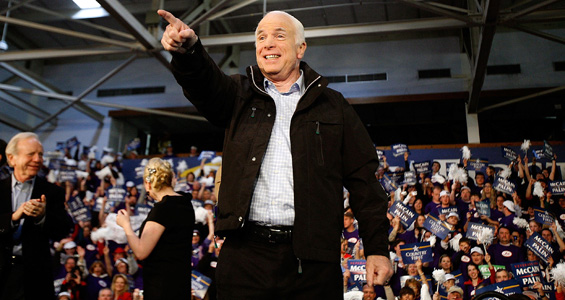A McCain presidency’s ‘to do’ list
Al Jazeera looks at how a possible McCain presidency may treat issues facing the US.

 |
| John McCain had been banking on the war in Iraq being a major election issue [GALLO/GETTY] |
Keeping in mind John McCain’s own chastising of Barack Obama for prematurely “measuring the drapes,” Al Jazeera takes a look at what the Republican will have on his own “to-do” list should he wake up as President-Elect on November 5th.
Foreign policy:
This was supposed to be the election where if the war in Iraq was the number one issue on voters’ minds and McCain would have been in a unique position to campaign as a supporter of it.
He was supposed to be successful because of how and why he argued for continued US involvement in Iraq – proof that on the big issues,he really does live up to his reputation as a “go-it-alone” maverick.
| In depth | ||||||||||||||

Focus
Your Views
|
Alone among congressional Republicans, McCain repeatedly pronounced the first years of the US occupation a failure.
He loudly blamed then-defence secretary Donald Rumsfeld for the failure.
He all but dared US president George Bush to fire Rumsfeld – a move that endeared McCain to anti-war Democrats and independent voters alike.
Also, against the Bush administration’s attempts to streamline US military operations, McCain called for deploying more US troops in Iraq in order to put down the insurgency – something that was not done until the beginning of 2007.
McCain opposes an early withdrawal from Iraq; he has campaigned for “victory with honour” and has come under fire for suggesting that the US presence in Iraq could for last decades.
He has proposed balancing the estimated $10-12 billion monthly expense for Iraq operations with cuts in other defence programs, notably new aircraft.
In tandem with his Iraq policy, McCain has promised to expand the so-called “Global War on Terror,” although he has pushed for stricter controls on intelligence gathering programmes that may snare US citizens by mistake.
McCain is also calling for an expansion of the US’ missile defence systems to deal with potential threats from rivals such as China and Russia – a multibillion-dollar project.
With inflation now on the rise, balancing the budget may require deeper programme cuts than US defence contractors are prepared to accept.
McCain also wants to expand the number of active-duty soldiers and marines – another net increase in spending.
Notably absent from his campaign pronouncements this year is his position on relations with international bodies such as the United Nations and the European Union.
Any instinct McCain has to engage with these organisations might affect his standing with conservatives wary of the institutions’ influence – and blunt any of his attempts to promote a pragmatic foreign policy strategy.
Domestic issues:
This is an area where Democratic candidate Barack Obama has argued a McCain presidency would represent an extension of the policies of George Bush’s administration.
Obama is mostly correct, except in two areas – immigration reform and abortion.
McCain has supported a plan to give illegal immigrants a path to citizenship, but current economic problems might make passage of such a plan harder.
| US Elections 2008 | ||||||||
|
And while he is “pro-life”, McCain has said in the past he would support funding for both contraception and abstinence education in foreign family planning programmes.
McCain would try to reform the health care system by providing a $5,000 tax credit to families and making it easier for workers to keep their health insurance when they change jobs.
His argument is that companies would save money.
He still backs partial investment of Social Security taxes in the stock market, though President Bush was soundly defeated when he unveiled the scheme in 2005.
McCain also wants to find a way to expand benefits for veterans, although he voted against a veterans’ education funding bill in 2008 because of concerns about the growing government budget deficit.
Where McCain agrees with President Bush is in areas such as expanded offshore oil drilling and the construction of 25-30 new nuclear reactors in the next 30 years.
Environmental groups hate the first idea, but have begun softening their opposition to the second on air quality grounds.
Other areas of agreement are the protection of individuals’ rights to own and carry firearms and the selection of conservative jurists to fill the nation’s courthouses.
Economic issues:
McCain has admitted in the past to being less than fully schooled in economic matters, but he has surrounded himself with advisers who have recent federal budgetary experience.
His top economic adviser once led the Congressional Budget Office, and a key campaigner served in George Bush’s administration as both trade representative and chief budget planner.
| In focus |
 In-depth coverage of the US presidential election |
McCain’s broad plan includes trying to win the right to veto individual items in the federal budget – something Congress has denied previous presidents – reaching more free-trade accords, and trying to find ways to reduce regulations that govern business operations.
That last priority runs counter to the current political mood to rein-in business practices as lack of regulation and government oversight is perceived to be the reason why the global financial markets are crashing, taking jobs, pensions and a sense of security down with them.
McCain has also vowed to help homeowners in danger of losing their homes with a $300 billion refinancing initiative – but so far that plan, and others proposed by Congressional Democrats, have yet to be fully discussed.
With the recession expected to run at least two years, and both political parties under pressure to help US consumers survive the downturn, this could be one area where McCain could make some early headway – and demonstrate another of his vaunted traits: his ability to work with leaders of BOTH political parties.




